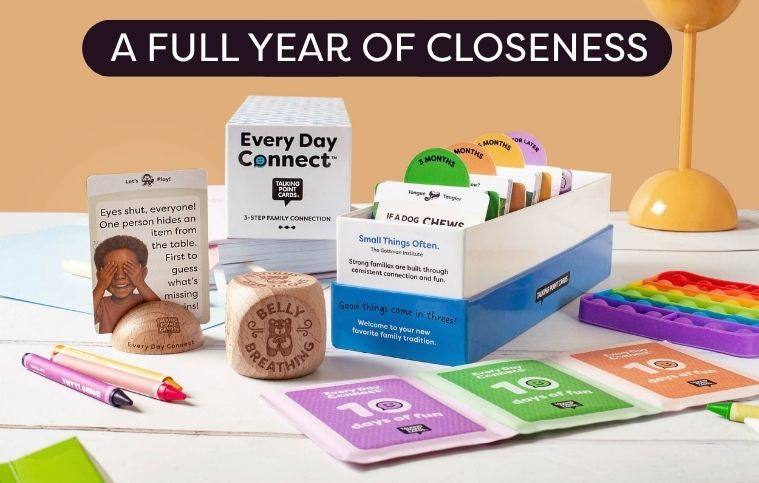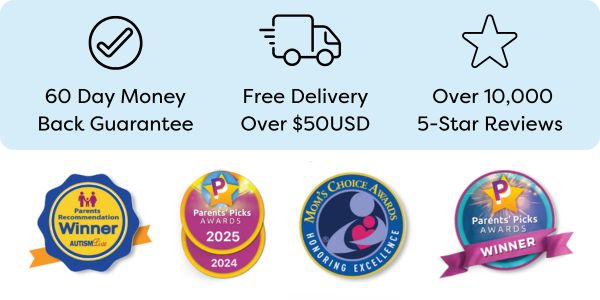SHOP
About
Laying the Groundwork for a Stronger Relationship
Build Trust and Connection Through Thoughtful Conversations

Ever notice how some couples seem to get each other on a deeper level? Like they're operating on the same wavelength, finishing each other's sentences, and generally just... clicking? Yeah, it's not magic (sorry to burst that bubble). What you're actually seeing is the result of countless hours of genuine, thoughtful conversations that have built a foundation of trust and understanding. But here's the thing - most of us weren't exactly given a manual on "How to Have Deep Conversations 101" when we started dating.
So, let's dive into the art of meaningful communication and explore how to strengthen your relationship one conversation at a time. Because let's face it - Netflix and chill is great and all, but have you ever experienced the high of a conversation so good it makes time disappear?
Why Conversation Matters More Than You Think
Think about it - what's the first thing that happens when you meet someone new? You start talking. Conversation is the cornerstone of human connection, and in relationships, it's basically the construction crew, architect, and building materials all rolled into one. Without good communication, you're essentially trying to build a house on quicksand. Good luck with that.
"The single biggest problem in communication is the illusion that it has taken place."
George Bernard Shaw

Research shows that couples who engage in regular, meaningful conversations report higher levels of relationship satisfaction. But here's where it gets interesting - it's not just about the quantity of communication, but the quality. You could talk all day about what to have for dinner or who forgot to take out the trash, but that's not going to build the kind of connection that makes relationships thrive.
The Trust-Communication Loop
Picture trust and communication as two kids on a seesaw. The more you communicate effectively, the more trust builds. The more trust you have, the more comfortable you feel communicating openly. It's a beautiful cycle when it works - and a frustrating deadlock when it doesn't.
Getting the Conversation Started
Let's be real - sometimes getting past "How was your day?" feels harder than solving a Rubik's cube blindfolded. Here are some conversation starters that can help you dig deeper:
-
"What's something that made you smile today?"
-
"If you could change one thing about your day, what would it be?"
-
"What's been on your mind lately that we haven't had a chance to talk about?"
The Art of Active Listening (Yes, It's Actually an Art)
We've all been there - nodding along while secretly thinking about what we're going to say next or whether we remembered to turn off the oven. But here's the thing: true listening is an act of love. When you really listen to someone, you're saying, "You matter. Your thoughts matter. Your feelings matter."

Some key components of active listening:
-
Put down your phone (yes, really)
-
Make eye contact (but don't stare like a creep)
-
Ask follow-up questions
-
Reflect back what you've heard ("So what I'm hearing is...")
-
Hold off on offering solutions unless specifically asked
Creating a Safe Space for Vulnerable Conversations
Nobody's going to open up if they feel like they're being judged harder than a contestant on a reality TV show. Creating a safe space for conversation means:
1. Check Your Reaction Face
You know that face you make when someone tells you something you totally disagree with? Yeah, work on that. Practice maintaining a neutral, supportive expression even when your internal monologue is going "WHAT THE ACTUAL...?"
2. Embrace the Awkward Silence
Silence in conversations is like the rest between musical notes - it gives meaning to what comes before and after. Don't rush to fill every quiet moment. Sometimes people need a beat to gather their thoughts or build up courage to say something difficult.
3. Use "I" Statements
Instead of "You always..." or "You never..." (which, let's be honest, are usually followed by something the other person won't want to hear), try "I feel..." or "I've noticed..."
The Different Types of Conversations That Build Connection

1. The Daily Download
These are your everyday check-ins. They might seem mundane, but they're the bread and butter of relationship communication. Pro tip: Instead of the generic "How was your day?" try something like "What was the most interesting part of your day?" or "Did anything unexpected happen today?"
2. The Deep Dive
These are your philosophical discussions, your "what if" scenarios, your hopes and dreams conversations. They often start with questions like:
-
"What do you think happens after we die?"
-
"If you could master any skill instantly, what would it be and why?"
-
"What's something you believe that most people disagree with?"
3. The Conflict Conversation
Nobody likes these, but they're essential for relationship growth. The key is to approach them as problem-solving sessions where you're both on the same team, fighting the problem rather than each other.

Common Communication Pitfalls (And How to Avoid Them)
The Assumption Trap
You know what they say about assumptions - they make an... well, you know the rest. We often think we know what our partner is thinking or feeling, but unless you're actually psychic (spoiler alert: you're not), you're probably off base at least some of the time.
The Problem-Solving Reflex
Sometimes, especially for guys (sorry, dudes, but it's true), the instinct when hearing about a problem is to immediately start brainstorming solutions. But often, your partner just wants to be heard and understood. Try asking, "Do you want my advice, or do you just need me to listen?"
The Smartphone Sabotage
Nothing says "What you're saying isn't important to me" quite like scrolling through Instagram while your partner is trying to talk to you. Unless you're expecting an urgent call from the President, put the phone away during conversation time.
Advanced Conversation Techniques for Relationship Ninjas
1. The Validation Variation
Instead of just nodding along, try actively validating your partner's feelings: "That sounds really frustrating. I can see why you'd feel that way."
2. The Curiosity Gambit
Approach conversations with genuine curiosity. Instead of assuming you know where the conversation is going, be open to surprises. Ask questions that show you're interested in learning more about your partner's perspective.
3. The Empathy Echo
Try to put yourself in your partner's shoes and reflect that understanding back to them. "If that happened to me, I think I'd feel really overwhelmed. Is that how you're feeling?"
Non-Verbal Communication
Did you know that according to some researchers, up to 93% of communication is non-verbal? That means what you're not saying might be louder than what you are saying. Pay attention to:
-
Body language
-
Tone of voice
-
Facial expressions
-
Physical touch (or lack thereof)
-
Eye contact

Making Time for Quality Conversations
In our busy, always-connected-but-somehow-disconnected world, finding time for real conversations can be tougher than trying to eat soup with a fork. Some tips:
-
Schedule it: Yes, really. Put it in your calendar if you have to.
-
Create rituals: Maybe it's a Sunday morning coffee date or a walk after dinner.
-
Ban phones during designated conversation times
-
Use commute time (if you commute together)
-
Cook together - something about chopping vegetables makes people open up
When Conversations Get Tough
Let's be real - not every conversation is going to be all sunshine and rainbows. Sometimes things get heated, uncomfortable, or just plain awkward. When that happens:
-
Take a break if needed (but set a specific time to return to the conversation)
-
Use the "sandwich" method for difficult topics (positive-negative-positive)
-
Remember that it's okay to be vulnerable
-
Focus on understanding rather than winning
The Future of Your Relationship: Building a Communication Legacy
Think about the kind of relationship you want to have 5, 10, or 20 years from now. The conversations you have today are laying the groundwork for that future. Every time you choose to engage in meaningful dialogue, you're making a deposit in your relationship's emotional bank account.
Building a strong relationship through conversation isn't a destination - it's a journey. Some days you'll have conversations that change your life, and others where you can barely string two words together. That's okay. What matters is the consistent effort to understand and be understood.
Remember, every great love story starts with a conversation. Keep talking, keep listening, and keep growing together. And hey, if all else fails, you can always fall back on discussing what to have for dinner - just maybe try to sprinkle in some deeper topics between deciding between pizza and Thai food.
LIKED THIS ARTICLE?
SIGN UP FOR MORE!






